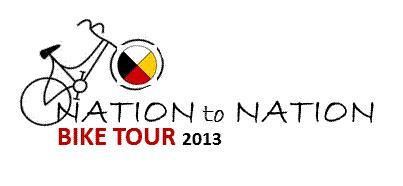Please support our coverage of democratic movements and become a supporting member of rabble.ca.
Between June 21 and July 1 — National Aboriginal Day to Canada Day — we’ll be featuring a series of articles examining and critiquing the uses of Canadian identity, the resurgence of Indigenous movements for justice, and the ways in which activists and thinkers across these lands are addressing these fundamental questions.
As Idle No More’s Sovereignty Summer approaches, I keep coming back to this memory from another summer in 2003.
My travelling companions and I were sprawled, sleeping, across the cool vinyl seats of the Grassy Narrows First Nation school bus. Dozing in the seats were half a dozen Anishnaabe youth involved in a blockade of clear-cut logging operations in their community’s traditional territory. We were making the overnight drive to join a gathering of environmentalists north of Toronto. As an ally at the blockade site, I had been invited along as a back-up driver.
Our sleep was roughly interrupted when a moose appeared in the headlights. The driver spun the vehicle to one side (to this day I’ve never seen a school bus up on two wheels ever again) and skidded around the cow. Inside, we picked ourselves up off the bus floor, incredulous and happy to be alive.
Delayed by our ungulate misadventure, our late arrival at the environmentalists’ camp meant we’d missed supper, as well as the message that we were to bring tents and sleeping bags. We spent the night in a motel on someone’s personal credit card.
The moose and motel mishaps had been somewhat of a joke, but the next morning’s workshop session was less amusing. The contrast was cinematic: blonde dreadlocked activists in bare feet suggesting that northern Ontario forests should become protected parkland; rez youth in their Nikes and track suits first listening, then defending: “The forest isn’t empty. We’re part of it. And we harvest the wood.”
Ten years later, have relations between indigenous sovereignty activists and urban-based green warriors changed for better or worse? Will Idle No More-sponsored actions be the birthplace of new alliances or an arena for environmentalist-sovereigntist head-butting?
On April 22, the Indigenous Environmental Network (IEN) and Defenders of the Land welcomed Indigenous and non-Indigenous people to an Earth Day gathering on Parliament Hill. The sun shone on a roster of speakers representing the spectrum of Aboriginal activism across Turtle Island. From northern MPs to trench-fighting environmental campaigners to women of the Families of Sisters in Spirit, each spoke to the original spirit of the Treaties, the need to protect rivers and lakes and to build an inclusive movement that works with “those we love, and those people we don’t love” (Bob Lovelace of Ardoch Algonquin). What kind of actions can meet those words?
At The Otesha Project, where I co-ordinate travel education programs focused on social and environmental justice issues, we are piloting a Nation to Nation bike tour in partnership with KAIROS. The tour begins with several days of cultural programming hosted by Akwesasne, then pedals along the north shore of the St. Lawrence River toward Kingston facilitating theatre-based dialogue about Treaty relations. Bringing together volunteer riders from a range of Indigenous and non-Indigenous communities, it will be bit of an end-of-summer litmus test for Indigenous-ally relations. If it’s anything like past Otesha tours, we can expect life-long connections to form among volunteers, but on this trip we are also aiming to embody a Nation to Nation Treaty relationship that lives in heart and body, not just intellectualized on paper.
The discussion at the 2003 environmentalist camp ended with an invitation from the blockade organizers to the urban activists to visit their territory and see things through their eyes. One young man did, and with the Forest Action Network, launched a collaborative campaign against Weyerhauser’s cutting practices. Persistence and empathy from all parties are pre-conditions of solidarity. This Sovereignty Summer, that alliance is a reminder that the all-night bus ride is worth it.



